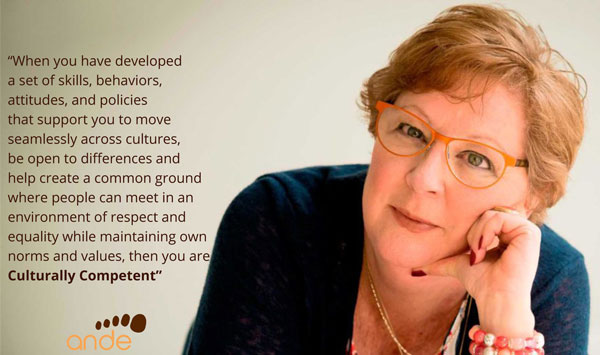Each of us brings our norms and values to any relationship. This is not any different from coaching sessions. Understanding your norms and values is essential to creating an atmosphere of partnership and equality.
Norms are the base of who you are, what you believe in and with whom you identify with (social groups). Values are based on our norms and shape our behavior and thoughts and determine how we act towards other people and situations.
When we work across cultures, relationships tend to be more complicated because the set of norms and values might differ, or have a different meaning or importance, hence the importance of being culturally competent.
“Culturally competent is when you have developed a set of skills, behaviors, attitudes, and policies that support you to move seamlessly across cultures, be open to differences and help create a common ground where people can meet in an environment of respect and equality while maintaining own norms and values.”
As coaches, we learn skills and core coaching competencies, but these competencies are not always transportable from culture to culture. Coaches juggle a lot of skills during a coaching session: we need to listen, we need to create trust, ask questions that have an impact and create awareness, sometimes is more efficient to communicate (sometimes in a language that is not our mother tongue) in a more direct manner, look at our client for non-verbal clue When working across cultures, these skills need to be even more fine-tuned, and the coach needs to stay sharp.
When our perspective gets in the way
During my work as a business consultant, I traveled to many countries all around the world. I was open and alert to the environment. I remember once, going to Bulgaria for a meeting with the minister of labor and social development to discuss a project funded by the European Community. Bulgaria was then a communist country. I had read a bit about the history and the communist regime and was confident that with the information I had gathered and my experience working in other Eastern European countries I would manage well.
During chats with taxi drivers, hotel employees and my counterpart, I noticed I was starting to create some resistance; I just could not pinpoint what it was. I realized that after I had asked a question, I was never 100% sure what people meant. Was it a yes, no or a maybe? At one point I started distrusting the professionalism of my translator. While he was translating something and I could see the non-verbal language of the speaker to say something different.
I decided to confront Ilian, the interpreter, with my observations. I told him that I had noticed that while he was translating and saying things like NO, I could see that the speaker was nodding to something that for me meant yes, and when he was translating NO, the speaker was shaking their head, thus for me saying NO. Ilian was surprised I was paying attention and explained that in Bulgaria nodding means no and shaking your head means yes.
Talking about opposite worlds!
These subtle situations happen all the time during conversations and coaching sessions. Therefore, it is of most importance to understand that our perspective might get in the way when communicating with others and not understand that it is because of the cultural differences.

Culture and the Coach Core Competencies
Let’s have a look at the coach core competencies and see how culture can play tricks on us, when we are oblivious to the differences.
1. When creating trust: Not every culture starts trusting others right from the beginning. Some cultures will give you the time, some will need more time, and some will start with trusting you, and along the way make up their minds. In a coaching partnership trust is elementary if we are going to work on the same base and if we as coaches want to feel free to be direct when needed and always say what comes up to us. But when your client does not feel that the relationship is based on trust, they will not be themselves. Then better not to start coaching. It is important as a coach to be authentic, create space and take the time to connect with the client. Look, listen and share with the client, and when in doubt, ask. Time is of essence when starting a new relationship; there is always enough time to initiate the coaching session.
2. Coaching agreements: What has meaning for one culture does not have the same connotation for another one. Professionals, elders, and roles look very differently in each culture. If you, as a coach, are not aware of this, you will be struggling throughout the whole relationship, when it gets to one. Agreements have to do with trust but also with a clear understanding of what coaching is and how it works. In cultures where elders are respected and always listened to, a coaching relationship will be complicated, as the client will be listening and “obeying” you, rather than seeing you as an equal who is there to support them. Therefore, before, during and after you have set an explicit agreement with measures of success for each outcome; make sure that there is a common understanding of who the “owner” of the goals is and where lies the responsibility.
3. Presence: in coaching Presence is the ability to be fully conscious and create a natural relationship with the client, employing a style that is open, flexible and confident. This also means to be aware of your norms and values and how these might affect the relationship with a client that has a different set of norms and values than yours. Think women/men, Christian/Jewish, White American woman/Hispano-American male, two people talking the same language from different countries. The list is long! If the coach is not aware of these possible differences they might be making assumptions and not checking on them.
4. Active listening: Coaches, more than others, need to listen to what is being said, and also what is not being said. Did you know that silence is culturally determined? Therefore, it is utterly necessary to create the dialogue and develop the skill of managing silences and the feelings that might bring with it. Too much silence, not enough silence, might interfere with the coaching session.
5. Powerful questioning: One of the aims of powerful questions is creating awareness and bring the conversation to a deeper level. If you are not aware of hierarchy, the role women-man may be playing with your client, or the trust has not reached the right level, questions might create uncomfortable situations, and it can feel risky and vulnerable to probe further. Assumptions tend to take hold of us during powerful questioning and as a coach you need to be aware of your assumptions and biases before translating what your client might be saying.
6. Direct communication: Giving and receiving feedback is hard. Add to it cultural elements, and you might have significant problems in your hands. Without conscientious language and cultural competence, your directness and good intentions may backfire. Create a structure where you can safely give feedback and check if any cultural elements might be misinterpreted.
7. Creating awareness: is the ability to integrate and accurately evaluate multiple sources of information, and to make interpretations that help the client to gain awareness and thereby achieve agreed-upon results. Firstly listen for any discrepancies or disconnects, check if these are your assumptions and biases and then discuss them with the client. For example, Bulgarians gesture for no and yes are different to mine, but by asking the interpreter and expressing my frustrations, I became conscious that I was filtering information through my eyes, therefore, colouring parts of the conversation.
8. Designing action and managing responsibility: There are many theories about cultures and how some are more individualistic while others are more group oriented, therefore one should expect that planning and goal setting are very much culture determined. In the USA people tend to be very individual oriented, taking responsibility to create actions, while in Venezuela people are more group oriented and the responsibility is carried by the whole group. In societies where hierarchy plays and important role you will notice that planning and goal setting needs the approval of others. Most coaches focus on the ‘doing’ actions. However, cultural differences, thinking, creating, and being should hold as much emphasis.
9. Planning and goal setting: Planning and goal setting are an integral part of decision making. In coaching planning and goal setting are intended to promote the client’s self-discipline and hold the client accountable for what they say they are going to do, for the results of an intentional action, or for a specific plan with related time frames. Setting goals and how you implement them is very much defined by your culture and the social groups you belong to. Did you know that time is also culturally determined? Northern Europeans see time as a constraint; things have to be achieved in a determined fixed period. For Southern Europeans, time is just a guide. If a coach and client agree on a time for the client to achieve a particular goal (or homework), an American client will feel obliged to make it on time, while a Latino will consider time only as a proposition but not as the definite date to finalise something.
CONCLUSION
Mentoring and specific training will support coaches and managers to develop the culture competence. If you are you working with diverse groups or you are planning to expand your business across borders.
Join Us!
If you are working with clients from different background than yours, come and join us in the upcoming Mentor Coaching Sessions starting January 24, 2017. During the calls we review the Core Competencies through a cultural lens, so that you become consciously aware of the ways in which the invisible cultural elements can influence your relationship with your coachee. Read more



 Edmée is a Professional Certified Coach (PCC) and a Certified Mentor Coach with over 15 years of broad international experience supporting coaches to prepare for ICF certifications and individuals with their personal growth. Her trademark course
Edmée is a Professional Certified Coach (PCC) and a Certified Mentor Coach with over 15 years of broad international experience supporting coaches to prepare for ICF certifications and individuals with their personal growth. Her trademark course